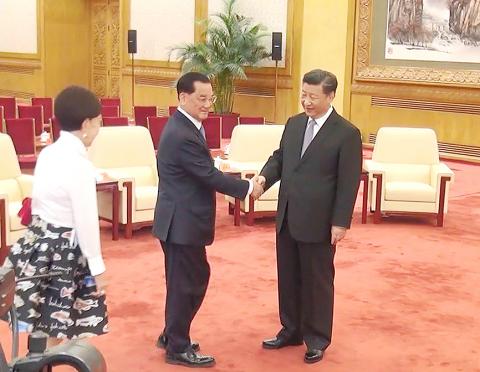If Chinese President Xi Jinping (習近平) genuinely wants to ease cross-strait tensions, he should talk directly with President Tsai Ing-wen (蔡英文), not through an opposition party figure who has long left public service, Taiwanese academics said.
Former vice president Lien Chan (連戰) met with Xi on Friday.
Xi said that “as long as the coordinates are correctly set in history, the ship carrying the hope of a peaceful cross-strait unification will eventually sail to the side of victory,” while Lien proposed four ideas to improve cross-strait ties, including that both sides “find common ground on the ‘one China’ principle, while maintaining their different opinions on the meaning of ‘one China.’”

Photo: CNA
Lin Wen-cheng (林文程), a China and Asia-Pacific regional studies professor at National Sun Yat-sen University, said that despite the rhetoric about providing economic benefits to Taiwanese, Xi must be aware that Bejing’s efforts to strong-arm the country — including poaching Taiwan’s diplomatic allies and forcing airlines to call it a part of China — have angered them.
The fraught situation across the Taiwan Strait is Beijing’s doing, and while Xi mentioned “seeking common ground while shelving differences (求同存異),” this concession is offset by his insistence on using Beijing’s “one China” principle as a precondition for dialogue, Lin said.
The refusal to appreciate the Tsai administration’s position makes the resumption of dialogue between the two governments unlikely, Lin added.
Xi chose to meet Lien, because troubles with Taiwan could further complicate the US-China trade war, he said.
Whether cross-strait tensions continue in the second half of this year could depend on whether the trade war escalates, Lin added without elaborating.
Taiwan Thinktank researcher Tung Li-wen (董立文) said that Xi mentioned the phrases “correct direction” and “correct path” repeatedly during his speech as a defense of his Taiwan policy, which he intended both Taiwan and China to hear.
That Xi mentioned the phrases repeatedly during his speech indicates defensiveness, Tung said.
Xi’s avoidance of naming Tsai or the Democratic Progressive Party government and his remark that “differences in opinion should not obstruct normal exchange across the Strait” could be an invitation for dialogue and de-escalation, Tung said.
Xi had said he would respect Taiwan’s social institutions and way of life, but Beijing still went forward with jailing Taiwanese human rights advocate Lee Ming-che (李明哲), as well as its air force and navy drills, he said.
As a result, Taiwanese do not feel the respect that Xi professed to have for Taiwan, and while Taiwanese hope for the best in him, they should continue to “listen to his words, but observe his actions,” Tung said.
During the meeting with Xi, Lien sparked controversy by saying that “cross-strait relations are not state-to-state relations and there is no room for Taiwanese independence.”
When asked to respond, Taipei Mayor Ko Wen-je (柯文哲) said both Lien and Chinese Nationalist Party (KMT) Chairman Wu Den-yih (吳敦義) have said Lien does not represent the party.
“If that is the case, Lien represents one opinion out of 23 million, which is his own personal opinion; we should take it for what it is,” Ko said.

Chinese Nationalist Party (KMT) Chairman Eric Chu (朱立倫), spokeswoman Yang Chih-yu (楊智伃) and Legislator Hsieh Lung-chieh (謝龍介) would be summoned by police for questioning for leading an illegal assembly on Thursday evening last week, Minister of the Interior Liu Shyh-fang (劉世芳) said today. The three KMT officials led an assembly outside the Taipei City Prosecutors’ Office, a restricted area where public assembly is not allowed, protesting the questioning of several KMT staff and searches of KMT headquarters and offices in a recall petition forgery case. Chu, Yang and Hsieh are all suspected of contravening the Assembly and Parade Act (集會遊行法) by holding

PRAISE: Japanese visitor Takashi Kubota said the Taiwanese temple architecture images showcased in the AI Art Gallery were the most impressive displays he saw Taiwan does not have an official pavilion at the World Expo in Osaka, Japan, because of its diplomatic predicament, but the government-backed Tech World pavilion is drawing interest with its unique recreations of works by Taiwanese artists. The pavilion features an artificial intelligence (AI)-based art gallery showcasing works of famous Taiwanese artists from the Japanese colonial period using innovative technologies. Among its main simulated displays are Eastern gouache paintings by Chen Chin (陳進), Lin Yu-shan (林玉山) and Kuo Hsueh-hu (郭雪湖), who were the three young Taiwanese painters selected for the East Asian Painting exhibition in 1927. Gouache is a water-based

Taiwan would welcome the return of Honduras as a diplomatic ally if its next president decides to make such a move, Minister of Foreign Affairs Lin Chia-lung (林佳龍) said yesterday. “Of course, we would welcome Honduras if they want to restore diplomatic ties with Taiwan after their elections,” Lin said at a meeting of the legislature’s Foreign Affairs and National Defense Committee, when asked to comment on statements made by two of the three Honduran presidential candidates during the presidential campaign in the Central American country. Taiwan is paying close attention to the region as a whole in the wake of a

OFF-TARGET: More than 30,000 participants were expected to take part in the Games next month, but only 6,550 foreign and 19,400 Taiwanese athletes have registered Taipei city councilors yesterday blasted the organizers of next month’s World Masters Games over sudden timetable and venue changes, which they said have caused thousands of participants to back out of the international sporting event, among other organizational issues. They also cited visa delays and political interference by China as reasons many foreign athletes are requesting refunds for the event, to be held from May 17 to 30. Jointly organized by the Taipei and New Taipei City governments, the games have been rocked by numerous controversies since preparations began in 2020. Taipei City Councilor Lin Yen-feng (林延鳳) said yesterday that new measures by